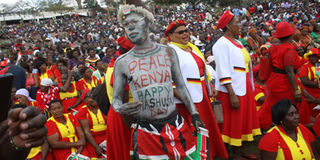Nairobi is a brand we must jealously guard

Wananchi mark Mashujaa Day at Uhuru Park in Nairobi on October 20, 2017. We must jealously guard Nairobi. Few nations can boast of its ideal location and climate. PHOTO | ANTHONY OMUYA | NATION MEDIA GROUP
What you need to know:
- Nairobi became a municipality in 1919, and rapidly grew into the natural capital of British East Africa.
- At independence in 1963, it assumed a fully fledged status as the capital of the new Republic of Kenya.
Dr Tom Mboya Okeyo, a former Kenyan ambassador to the United Nations Conference on Disarmament and also the World Trade Organisation in Geneva, once said that “Nairobi City belongs to Africa and the international community as well as being an integral part of the national security of many other nations globally”.
I couldn’t agree with him more.
However, let us take a mental excursion way back to 1899, when Nairobi became of special interest to the British colonisers as a railway depot during the construction of the Kenya-Uganda railway.
MUNICIPALITY
Then, the area was predominantly occupied by Maasai pastoralists and Kikuyu agriculturalists.
It derives its name from what the Maasai referred to either as Enkare Nyorobi or Ewaso Nyirobi, meaning the place of cool waters.
It became a municipality in 1919, and rapidly grew into the natural capital of British East Africa.
In 1954, Nairobi became a city and enjoyed geo-political prominence in East Africa.
UNEP
At independence in 1963, it assumed a fully fledged status as the capital of the new Republic of Kenya.
In 1976, Nairobi achieved a rare distinction in the United Nations family by hosting the UN Environment Programme (Unep).
Today, Nairobi is among the four cities that host UN offices: New York, Geneva, and Vienna.
From being home to the Unep, it is now a fully fledged UN office as the headquarters of Unep and the UN Human Settlement Programme (UN-Habitat) with some 22 regional offices, entities and volunteers.
US EMBASSY
The real estate, which is the home of the UN offices in Nairobi (Unon), is more than 300 acres, which is the largest of any of the UN office areas and assets, worldwide.
In addition, Nairobi hosts the largest United States Embassy besides other foreign missions in Africa, with the highest concentration of diplomats and families outside of New York, Washington, Geneva, Vienna and London.
Whereas our political exigencies are often driven by highly partisan thought, it is time we appreciated that we cannot be too domestic-minded in our thinking to the exclusion of what the international family thinks of the disruptions we cause to the diplomats and their activities at the Unon.
PROTESTS
The diplomats and staff have to think of their families’ security.
This calls for maximum restraint and care as we agitate for change.
Yes, our Constitution provides for protests and picketing, but without compromising the rights and freedoms of others.
Paradoxically, what we have witnessed since last year during the agitation for the resignation of then IEBC chairman Issack Hassan and commissioners, and the protests to force changes in the IEBC, offers a stark contrast to our declaration of respect for the Constitution.
CONSTITUTION
Mounting roadblocks, carrying stones, wielding sticks, threatening and injuring motorists and pedestrians, and disrupting businesses is anything but peaceful.
Our leaders must appreciate that we struggled for over 20 years to come up with the 2010 Constitution, which is one of the most expansive, liberal and human rights-based documents in the world.
Though we must breathe life to the Constitution by testing it, there is no substitute for civilised conduct, the rule of law and due process.
In fact, no individual or organised group can and must be allowed to cause pain and suffering to fellow Kenyans and foreigners to achieve political goals.
DIALOGUE
We have a working judicial system for litigation on grievances.
Our challenges as a nation are not only political, they are also social and economic.
Following the October 26 repeat presidential election, should we undertake a serious national dialogue that will involve an audit of the Constitution to come up with a framework of amendments in a structured and informed fashion?
Anything outside an agreed framework of engagement will not bear positive results.
VANTAGE
This is manifestly clear if we carefully study the implications and practicability of change under Chapter 16 of the Constitution, specifically Articles 255, 256 and 257.
Let no individual or any political party delude themselves that they have a way of amending or changing the Constitution without a national consensus.
Fellow Kenyans, Nairobi is probably our greatest co-competence.
We must jealously guard this brand. Few nations can boast of its ideal location and climate.
Mr Kabage is an advocate of the High Court of Kenya. [email protected]





